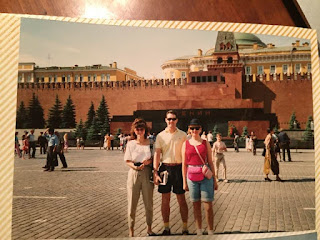For What It’s Worth

I’m wanting to jump past this part
of my book. It’s not very political? It’s irrelevant, supposedly political and
yet decidedly apolitical?
My Own Identity
Politics? Within this highly charged—downright electric—landscape in which
nations were literally emerging, a writer-like person was hiding out too: and
yet, I’d persist haplessly in a foreign terrain. I was a lost cause, a writer already
undercover, pretending in politics.
It’s my summer in
the Soviet Union. Yes, that Soviet
Union.
My part of the Soviet
Union was as you might imagine it to be: colorless high rises and patches of
weeds stretching throughout haunting projects, a grayish pallor over a city
crisscrossed with tram wires overhead and situated on top of a metro system
that reeked of infinity and unhappiness and industry and dank urbanity, trousers
with holes on sad men, ripped stockings not worthy of being called nylons on
women with unfashionable purses, Orwellian grocery stores with nothing on the
shelves, crazy old ladies yelling random Russian shit at our brazen American
streetwalking, so many serious faces—on children even. Leningrad (now St.
Petersburg) was a cosmopolitan disaster: punctuated by beautiful churches with
onion-bulb tops, gold-plaited estates once occupied by Czars, and the Hermitage
with its trove of world art hung in slapdash splendor across palatial walls
papered in thick red velvet—the very site at which the 1917 Bolshevik
Revolution happened and the royal family was led to a bloody slaughter except
for, maybe, Anastasia.
I don’t really
know where Putin was just yet. Doing KGB stuff, perhaps. I actually think we
were both at the same university at the same time, but—right then, in 1990—Gorbachev
was in power, and he was a good guy! Glasnost
and perestroika were the buzzwords: openness and reconstruction. It was almost all over for the U.S.S.R.; the Iron
Curtain was coming down. Boris Yeltsin was making waves, and people were
talking. The Eastern European Bloc had fallen apart, mostly in 1989. The Berlin
Wall was in shards. Plus, Iraq was on the verge of attacking Kuwait.
And I was just a
college girl studying political science.
And
Russian.
Because
I wanted to be a diplomat/U2 ambassador/world-traveler.
Because
of Cold War thinking.
Because
of a boy who also took Russian.
So,
yeah, I think I ended up taking three years of the language, two years of
Russian Humanities, and a Soviet Politics class.
Do not speak to me in Russian.
Do. Not. Do. It.
Madonna
posters adorned Helsinki, where we landed and walked around for a few hours in
the bedazzling glories of European capitalism, replete with chiseled cheekbones
and Nordic good cheer. We took a train into Leningrad—a scary sleeper train
straight out of Anna Karenina (and
you know how that ended) which rattled along old tracks leading from Finish Grandeur
into Dictatorial Hell. We were, the group of college kids and the professors
from Arizona, fearful of Commies and of anal probes because we didn’t have the
right papers.
In
the summer of 1990, I went on a Russian Language program to Leningrad for four
weeks (with a fifth week in Moscow). After the academic program, I met friends
and we spent the rest of the summer in Europe.
I look at the
snapshots.
They’re all that’s
left.
I’ve lost my
language skills completely.
Man and Woman on Red Square, Moscow (July 1990)
Walter is in his
early thirties, so he’s old. I’m twenty, and though I wish I could say my hair
is brassy or sun-drenched, it’s bozo-red.
I’m in travel mode: wearing glasses, a tie-dye top, a vicious pink fanny pack.
Walter
is Canadian and possibly a business management professor at Harvard. I’m not
sure. He’s dapper-ish, maintaining a level of attractiveness that eluded me.
I’m not into him, because my affections are elsewhere, but we do tend to move
in the same Russian Language Emersion Program circles.
Actually,
he’s had a fling with one of the pretty girls on our program, even though he’s
in a relationship at home in Canada or Harvard.
I
say to him one time when we’re alone, “But you have a girlfriend?”
Walter
gives me some line, like, What happens in
the Soviet Union stays in the Soviet Union.
Oh.
But
we are in Moscow now, and the trip is almost over. He will return to Canada or
Harvard, and I will move on to Europe. Walter says to a group of us standing on
Red Square, “I’m not going to pretend we’re keeping in touch, because we
won’t.” He looks at all of us, students before the Kremlin. “So don’t write.”
The fling girl is
older than I, cute, worldly, not torn apart or anything by his indifference.
On Nevsky
Prospect, back in Leningrad, she had shared an ice cream cone that was dripping
from both ends with this other American kid on the program. Walter and I had
watched. A seductive, titillating sight. He had not cared, either.
The
Twenty-Eighth Communist Party Congress is about to begin. Dan Rather is
somewhere around. Lenin’s Tomb is still there.
During the past
month, I’ve eaten a hairball baked into my breakfast, attended the world-famous
Bolshoi Ballet sans Barishnikov who’s probably home in Manhattan, and eaten at
the brand new McDonald’s in Moscow. I’ve attended the circus with my
professor—it was utterly devoid of weirdness (why the hell not?). I’ve gone to
Peter the Great’s glamour-pad palace on the outskirts of Leningrad, and I’ve
shadowed Dostoyevsky on imagined Russian paths. Pushkin, Gogol, and Checkov
whisper constantly in our ears—and though I am officially in Soviet territory
on political business, I am secretly a writer taking notes. I’m just watching
people, a voyeur, a literary pornographer.
In
the middle of Red Square, Walter—Wall
Street Journal tucked under his arm—looks in my direction and says to me,
an unglamorous girl with a hot pink fanny pack around her waist, “Out of all
the people on this trip, you’re the one I’d like to know what happens to.”
You’re the one I’d like to know what
happens to.
Grammatically
awkward, utterly unprecedented.
His
comment is devoid of sexual intrigue, ulterior motive, monetary possibility.
It
is like the storming of my own Winter Palace.
And
so I went to Europe, and I never saw Walter again.
Since
then, there have been college degrees in unrelated fields. I’ve abandoned
careers and towns. Intellectual snobbery is my mink stole I’ve worn to parties
that I truly dread. Irresponsible debt gave me a good education. I waited for
heartbreaks to kill me, and they didn’t. My passport is stunning—stamped and
suggestive. Drag shows in Harlem, dinners at the Waldorf-Astoria, nights on
dung floors in Africa, holding babies in Shanghai orphanages, walks through
Roman ruins, hiding Cuban art in my suitcase when flying out of Havana. I
worked in Disneyland. I worked at Amnesty International, where I stole Harrison
Ford’s address from the P.R. person’s rolodex. I followed an elephant through
the Swazi bush.
There’s been a
coma and rehab and the death of a parent. For a full year, I did nothing. There
are people in my life who have disappeared completely. I wrote a poem once that
mentioned Dan Rather. It was very bad.
Walter, I’m this
other woman now.
I’ve published two
books, had two kids, lost two breasts, and suffered from insomnia.
I’ve married and
been separated. I once visited the apartment my husband was staying in while we
were apart and I moved through his rooms, looked in his fridge, wondered at his
life, saw it as a foreign country, contemplated renewing that visa.
I’ve stayed
state-side.
My
hair is still brassy, sun-drenched, bozo-red. But underneath the stain, it’s
fully gray.
Walter, where are you now?
Walter, what has become of you?
Have you headed into middle-age
with thinning hair and wrinkled skin?
Walter,
you are the Prufrock of my Soviet Summer.
Remember
when we spoke of Michelangelo?
If
you saw me now, if we were to meet at the Kremlin or at St. Basil’s, if we
happened upon each other on a flight out of Scandinavia: would you recognize me
today? Would you know who I am? Could you see past the skin damage, my flesh
now in ruins?
All
of our maps have changed, Walter.
Our
globe has shifted in unrecognizable ways, Walter.
Where are you now, Walter?
I
like to picture us in Antwerp or Brugge. We’d sit in a dark bar and show each
other pictures of our kids.
Walter, I’d say. Talk to me. Tell me
things.
My lost Walter.
If
we met today, in Portugal or Beijing, in New Delhi or San Salvador, would I
have to do all of the talking?
When
you’d throw your eyes over me as if I were naked and needed covering, when you
saw how time had elapsed on my face, when you tried to ignore the visible scars
on my body that hinted at a disaster far more serious than a hot pink fanny
pack—when you saw these things—after so many years, would you be disappointed?
Would
I disappoint you?
My Long-Gone Walter.
Are
you disappointed?



Comments
Post a Comment